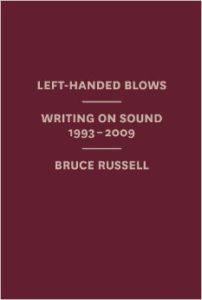 Bruce Russell
Bruce Russell
Left Handed Blows: Writing on Sound 1993-2009
Clouds: Auckland 2009. 115pp. NZ$35.
Bruce Russell has been an important contributor to sound/noise internationally for the past two and a half decades, both under his own name and as a member of the Dead C and Handful of Dust. However during this time he has also been publishing widely on the theory and practice of noise/sound/music, to which the contents of this volume attest.
The book is beautifully presented in matt wine-coloured covers with French flaps, and the title and author embossed in gold both on the front and the back. I have a weakness for handsomely produced books, and this, together with my great respect for Bruce’s sonic work, meant that I had great expectations upon opening this volume. I was not disappointed and was pleasantly surprised by what I found.
The book contains essays and dialogue pieces on a variety of topics loosely grouped around the concept of sound as creative endeavor. These vary from discussions of creative practice with Alistair Galbraith (of Handful of Dust) and Danny Butt (New Media Theorist/Critic and member of Rain, Flies Inside the Sun and Tanaka Nixon Meeting). The dialogues are especially illuminating on the practice of noise/sound art in New Zealand, and the essays vary from the polemics of “What is Free?: A Free Noise Manifesto” to the incredibly interesting philosopho-cultural pieces “Contra-Fludd/Contra-Kepler: the Disharmony of the Spheres Extolled in Ten Theses” and “To Think is to Speculate with Images: Rosicrucian Linguistics Revisited as a Semiological Discourse” – the second of which I found particularly informative.
I never knew Russell was such a theory buff. There’s a lot in here – especially the Frankfurt School. Lots of Lukács, Benjamin, Adorno; as seen from the title of “Contra-Fludd…” Robert Fludd and Johannes Kepler; and a fair bit of Guy DeBord to boot. Some may take issue with this (A recent review in The Wire described it as dense), but I’m all for it – perhaps because I’m the same way inclined myself.
Some people may also take issue with the polemicism of some of these pieces. They often mirror the tone of, for instance, the Toronto Research Group, or early tracts published in L=A=N=G=U=A=G=E, Open Letter, Poetics Journal et cetera, like Bruce Andrews “Writing Social Work & Political Practice”. However to criticism these pieces for such would be either to miss the point – misunderstand what they are doing – or contradictorily, to do what Russell is asking. As with much writing on fringe work the polemicism of these pieces operates in a similar fashion to a volume knob. The extolling of an extreme position allows the transmission or instigation of a discourse that would otherwise be sidelined or silenced. As such, those who take issue with aspects of this collection are allowing it to function in the manner intended – as Russell states, “this book is not an attempt at a coherent totalising theory” (1). It is the beginning of what I hope will be a fruitful discourse on noise both in New Zealand and elsewhere.